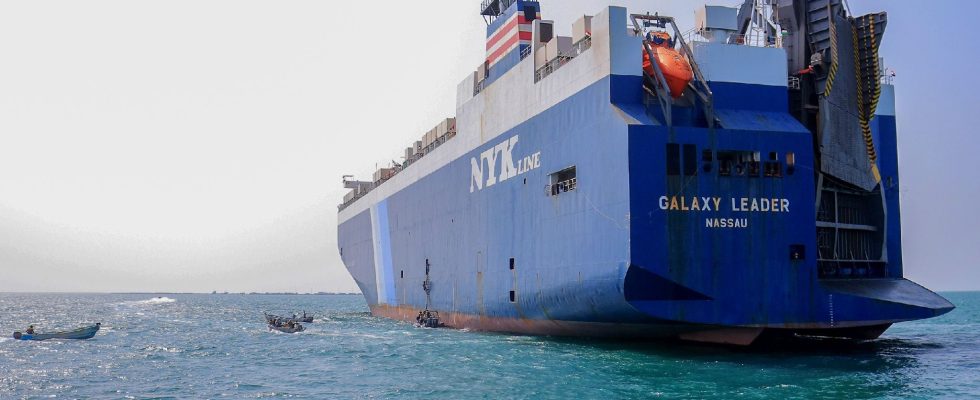One more attack. On Saturday February 17, the Yemeni Houthi rebels, supported by Iran, claimed to have managed to target the oil tanker named Pollux the day before “with a large number of naval missiles”, declared their military spokesperson Yahya Saree. According to the United States Central Command, this Panama-flagged cargo ship belonging to Denmark was targeted by three anti-ship ballistic missiles, launched from areas of Yemen controlled by the Houthis, without any injuries or damage. deplore.
Since November, this rebel movement, supported by Iran, has carried out a series of attacks against merchant ships in the Red Sea and the Gulf of Aden in “solidarity” with the Palestinians in the Gaza Strip, where Israel is in war against Hamas continued to the attacks of October 7. These maritime attacks have forced many shipowners to bypass this strategic route to connect Asia to Europe, through which 12% of world trade passes. More and more boats are deciding to take an alternative route via the Cape of Good Hope, in the south of Africa, a much longer and more expensive journey.
Israel’s first ally, Washington set up a multinational coalition in December, with the United Kingdom among others, in order to target the positions of the Houthis, particularly in the capital Sanaa, but without managing to stop the attacks in the Red Sea. . On Thursday, February 15, Yemen’s ambassador to France, Reyad Yassin Abdullah, called on the international community to “intervene to stop the actions of the Houthis.”
A one-year mission called “Aspides”
In order to secure maritime freight, the European Union will also launch a mission in the Red Sea for at least one year, according to a diplomatic source with AFP. Several countries have expressed their intention to participate in this mission called “Aspides” (“shield” in ancient Greek): among them Belgium, Italy, Germany and France. Spain has indicated that it will not participate.
This mission will be launched by the foreign ministers of the European Union, meeting in Brussels this Monday, but that does not mean that it will be immediately operational. It will be up to its command to determine when it will have sufficient resources, which should take “a few weeks”, estimates another European diplomat.
“Do not escalate the escalation”
The German frigate “Hessen” left on February 8 for the Red Sea with a crew of around 240 people. It will be in a state of permanent alert and will be able to respond to possible attacks with remotely controlled missiles, drones and “kamikaze boats”. Belgium has announced its intention to send its frigate “Marie-Louise”. France has said it is ready to make one of its frigates already present in the Red Sea available to the Aspides mission. Greece will assume general command and Italy will assume operational command at sea, according to a European source.
The Twenty-Seven agreed in January on the principle of a maritime surveillance and patrol mission in the Red Sea, provided however that its mandate is purely defensive. It will be able to fire to defend merchant ships or defend itself, but will not be able to target land targets against Houthi rebel positions in Yemen, according to diplomats. It is “important not to contribute to escalation in the region,” insisted one of them.
